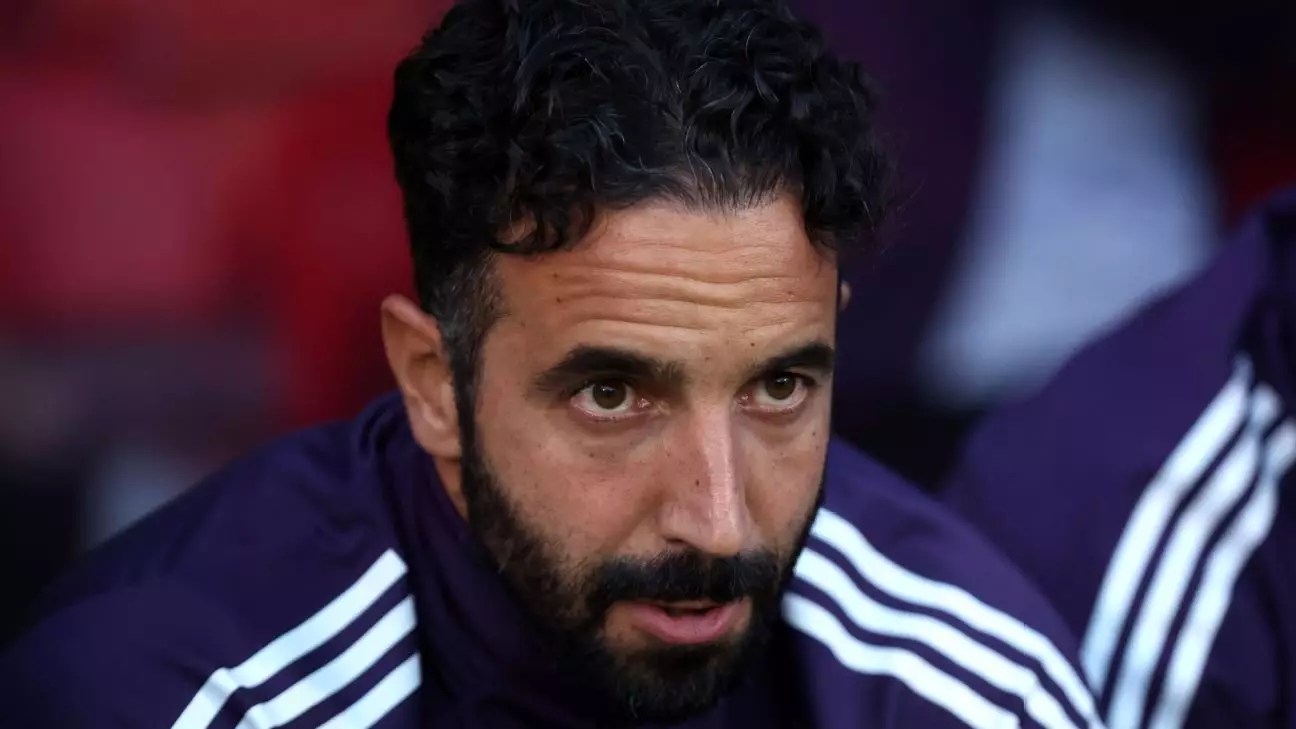Manchester United stands at a crossroads—an elite club known for its storied history now finds itself embroiled in uncertainty and turmoil. Although the club’s rich legacy and global stature often mask internal struggles, recent performances expose a team desperately searching for stability. The defeat at Grimsby Town, a fourth-tier side, wasn’t merely an upset; it was a symbolic rupture that laid bare deep-rooted issues. The shockingly poor exit from the Carabao Cup has prompted honest introspection, even among the most optimistic supporters.
Amidst this chaos, Ruben Amorim, the club’s current manager, faces mounting pressure. His comments post-match—where he openly admitted that “something has to change”—are emblematic of a deeper malaise. Such frankness, instead of calming nerves, magnifies the perception that United’s leadership still struggles to find a cohesive strategy. The club’s refusal to dismiss Amorim outright signals a complex layer of patience intertwined with frustration; however, this patience is teetering on the edge as more disheartening results threaten to accelerate change.
Analyzing the Manager’s Position in a Fragile Ecosystem
Ruben Amorim’s tenure at Manchester United has been a turbulent journey. Signed with promise and backed by a sizable contract through 2027, his leadership has yet to deliver consistent results. The statistics speak volumes: only seven wins out of 29 league matches, a mid-table 15th-place finish last season—United’s worst since dropping to the second division in 1974—and an inability to qualify for European competitions. These metrics generate doubts about whether Amorim possesses the tactical acumen and strategic vision necessary to restore the club’s dominance.
Furthermore, the psychological impact of recent setbacks cannot be understated. After a humiliating Europa League final defeat in May, the team appears to lack confidence and cohesion. The emotional tone Amorim conveyed—suggesting personal doubts and a willingness to reassess his position—raises questions about the internal climate. Is this evidence of a coach who is losing the dressing room, or simply a leader grappling with immense pressures at a club notorious for high expectations?
Importantly, the cultural and footballing transition within United’s hierarchy complicates matters. Club investors like Sir Jim Ratcliffe and CEO Omar Berrada appear reluctant to inject hasty changes, perhaps hoping that patience will eventually bear fruit. Yet, the specter of a negative result against Burnley looms large, and insiders suggest that another poor outcome could ignite a crisis of confidence that forces the club to act swiftly. Amorim’s initial reluctance to accept the job mid-season and his desire for a summer transfer window overhaul reveal that perhaps this project was never fully his desired path—adding layers to the turmoil.
The Strategic Dilemmas and Future Directions
One of the more pressing issues isn’t just tactical instability but squad management and transfer strategy. United is actively trying to offload players such as Jadon Sancho, Antony, Tyrell Malacia, and Alejandro Garnacho—figures who symbolize both potential and discord within the squad. The difficulty in offloading Sancho and Antony underscores the financial and reputational challenges the club faces, complicating efforts to rebuild.
In the broader context, this tumult highlights the pivotal role of managerial stability versus radical overhaul. Should United consider a radical change in leadership to reset expectations? Or is there merit in supporting Amorim through this turbulent phase, consolidating their vision for the future? My own opinion leans toward the former: brutal honesty recommends that if the next few results are equally catastrophic, a managerial change may be the only way to jump-start morale and ambitions. Clinging to a coach amid continued failure risks more damage—not only to team confidence but to the club’s global reputation.
However, a manager’s influence cannot be overstated. Amorim seems to lack a clear tactical identity, and his team’s inability to adapt or find consistency suggests deeper issues. The club’s strategic focus must now extend beyond players to leadership philosophy. In this context, cutting ties might be painful but ultimately necessary if United’s historic ambitions are to be revived.
The Crucial Window: A Test of Vision and Resolve
As the transfer window nears its conclusion, United’s focus is on strategic squad adjustments—moving players out and bringing in reinforcements capable of catalyzing change. High-profile moves for Garnacho and Antony are seen as pivotal, yet their success hinges on convincing other clubs and managing player expectations. The attempted loans for Malacia and scouting for other talents reflect an acknowledgment that squad depth and morale are sorely lacking.
Ultimately, Manchester United’s current crisis exposes the fragile nature of football management at the top level. The club’s illustrious history and global pull cannot shield it from internal discord and tactical failures. The patience of the hierarchy, while commendable, is not limitless. The next few fixtures—and the performances therein—will inevitably define the future. Will United’s leadership have the courage to make tough decisions swiftly, or will they continue down a tumultuous path that risks leaving them further behind in the competitive landscape? Only time will reveal whether this is a moment of rebirth or a further descent into uncertainty.


Leave a Reply